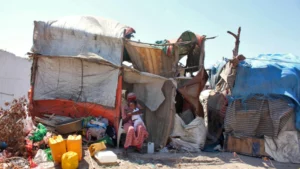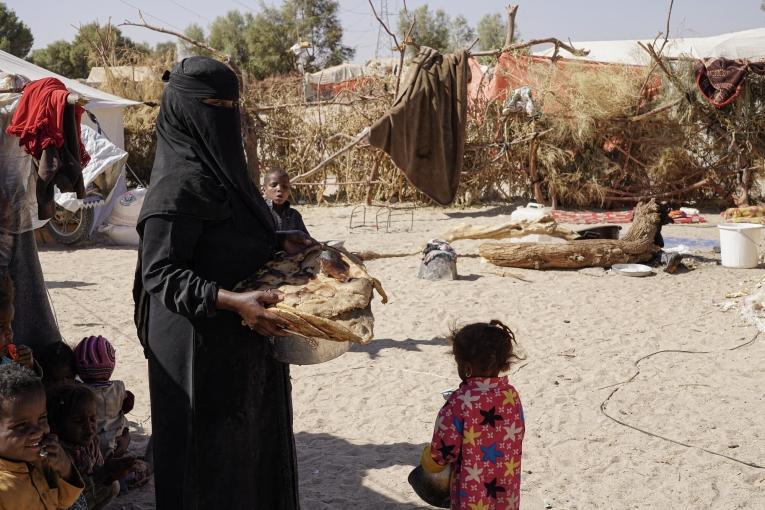A woman carries bread for breakfast. Displaced camp in Al-Khuseif, Marib. Yemen. 2021. © Hesham Al Hilali.
Saudi border guards are responsible for the deaths of several hundred Ethiopian migrants who were attempting to cross the border between Yemen and Saudi Arabia between March 2022 and June 2023, according to a new report published by Human Rights Watch on Monday. These abuses occurred as Riyadh has been implementing an extensive anti-migrant policy for the past five years.
Several injured individuals are crowded in the back of a truck. Next to them, a body lies on the ground. These images, circulated on social media, were filmed by Ethiopian migrants along the border between Yemen and Saudi Arabia. They illustrate the abuses committed against them by Saudi border guards, as denounced by Human Rights Watch on Monday, August 21. “Saudi border guards have killed hundreds, if not thousands, of Ethiopian migrants and asylum seekers who were attempting to cross the border between Yemen and Saudi Arabia between March 2022 and June 2023,” writes the NGO in the opening of its new report.
Over a period of six months, between January and June 2023, the NGO interviewed 42 Ethiopians who attempted to cross this border or relatives of migrants who were killed. They analyzed multiple photos and videos posted on social media and meticulously examined hundreds of square kilometers of satellite images. “We have evidence that Saudi border guards use explosive weapons and shoot at migrants at close range, including women and children,” says Nadia Hardman, the lead researcher on migration for this investigation.

“I saw 30 people being executed at once”
“We faced repeated gunfire. I saw people being killed in ways I had never imagined. I saw 30 people being executed at once,” testifies Hamdiya, a 14-year-old, to Human Rights Watch. “I hid under a rock and slept there. I could feel people sleeping around me. It was only later that I realized they were corpses. I woke up and I was alone.”
Like this teenager, many witnesses claim to have been victims of mortar fire or other explosives launched by Saudi border guards during their attempt to reach Saudi Arabia, relying on the precise description of their assailant’s uniform to prove their identity.
“One witness explained that out of their group of 170 people, 90 were killed. This number was possible because the survivors went back to collect the bodies,” the report continues. “Out of 150 people, only seven made it. There were human remains everywhere, scattered,” recounts another witness. According to the document, another person went to the Saudi border to retrieve the body of a girl from her village. “Her body was piled on top of about twenty others,” she testifies. “It’s impossible to count the bodies. It’s beyond imagination.” These testimonies are corroborated by the discovery of several burial sites in the satellite images reviewed by the NGO, notes Nadia Hardman.
While the exact number of migrants killed during the border crossing is impossible to determine, the NGO reports several hundred, if not thousands, of deaths in recent months. Among the survivors, many have been severely injured and find themselves stranded in makeshift camps in Yemen without access to medical care or resources to leave.
Anti-Migrant Policy
Every year, tens of thousands of individuals attempt to flee the Horn of Africa towards the Gulf countries. Driven by economic difficulties, human rights violations, and ongoing conflicts in the region, they embark on the “Eastern Route,” one of the most important migration routes in East Africa – and one of the deadliest.
After crossing the Red Sea or the Gulf of Aden, which proves fatal for many, these migrants find themselves in Yemen, where Saudi Arabia has been leading a military coalition against the Houthi armed group since 2015. In this war-torn country, which is also facing a humanitarian crisis, Human Rights Watch has been denouncing numerous abuses against these migrants in transit for several years: trafficking, arbitrary detention, kidnappings, rape, and murder.
And for several years, their situation has not improved on the other side of the border. Like other Gulf states, Saudi Arabia was traditionally a preferred destination for migrants, accounting for approximately 37% of its population. However, in 2017, Riyadh implemented an extensive “Saudization” policy aimed at reducing its dependence on migrant workers and launched a massive deportation campaign. Over the past five years, tens of thousands of migrants have been sent back to Yemen or their home countries without money, housing, or medical follow-up.
These individuals have thus become pawns in the midst of regional tensions. In April 2020, Houthi fighters, engaged in a power struggle with the Yemeni central government, forcibly expelled thousands of Ethiopian migrants to the north of the country, forcing them to go to the Saudi border. Several dozen of them were killed, and many survivors were sent to detention centers located at the border. In 2019, HRW identified ten prisons and centers where migrants were imprisoned in the kingdom, which has never ratified the main international instruments relating to the imprisonment of migrants.
Call for an International Investigation
“While Human Rights Watch has been documenting and raising the alarm about the killings of migrants at the Yemen-Saudi Arabia border since 2014, these new revelations show a new escalation of violence with systematic killings,” concludes the NGO’s report.
“In recent years, Saudi Arabia has invested heavily in diverting attention from its human rights record, including spending billions to host major cultural or sporting events,” it continues. “But while it tries to whitewash its image, it is shooting unarmed civilians with explosive weapons.”
“If this is the result of a Saudi government policy aimed at killing these migrants, then it constitutes a crime against humanity,” insists Nadia Hardman, who calls for the opening of an international investigation under the auspices of the UN and urges participants in major international events sponsored by the Saudi government to publicly address human rights issues.
With AFP
